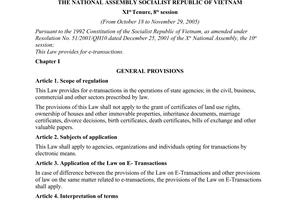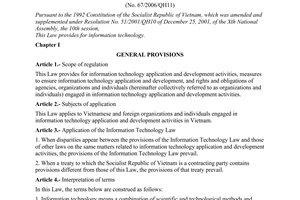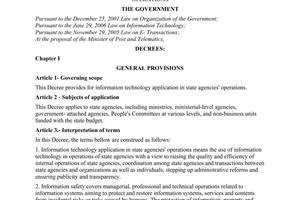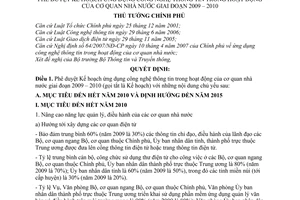Nội dung toàn văn Decision No. 48/2009/QD-TTg of March 31, 2009, approving the plan on information technology application in state agencies' operations during 2009-2010
|
THE PRIME
MINISTER |
SOCIALIST
REPUBLIC OF VIET NAM |
|
No. 48/2009/QD-TTg |
Hanoi, March 31, 2009 |
DECISION
APPROVING THE PLAN ON INFORMATION TECHNOLOGY APPLICATION IN STATE AGENCIES' OPERATIONS DURING 2009-2010
THE PRIME MINISTER
Pursuant to the December 25,
2001 Law on Organization of the Government;
Pursuant to the June 29, 2006 Law on Information Technology;
Pursuant to the November 29, 2005 Law on E-Transactions;
Pursuant to the Government's Decree No. 64/2007/ND-CP of April 10, 2007, on
information technology application in state agencies' operations;
At the proposal of the Minister of Information and Communication,
DECIDES:
Article 1. To approve the Plan on information technology application in state agencies' operations during 2009-2010 (below referred to as the Plan) with the following principal contents:
A. OBJECTIVES THROUGH 2010 AND ORIENTATIONS TOWARDS 2015
I. OBJECTIVES THROUGH 2010
1. Raising management and execution capacity of state agencies
a/ Development of e-agencies
- To ensure that on average 60% (30% in 2009) of direction and administration information of leaders of ministries, ministerial-level agencies, government-attached agencies and provincial-level People's Committees will be posted on their portals or websites.
- The average rate of cadres and civil servants using e-mails in performing their duties at ministries, ministerial-level agencies, government-attached agencies and People's Committees of centrally run cities will be 80% (70% in 2009); for provincial People's Committees, this rate will be 60% (50% in 2009) while for mountainous provinces (down to the district level), it will be 30% (20% in 2009).
- The rate of departments and offices of ministries, ministerial-level agencies and government-attached agencies and offices of People's Committees of centrally run cities using document management software and conducting online administration will be 90% (80% in 2009); for offices of provincial People's Committees and district-level People's Committees, this rate will be 80% (70% in 2009) and 50% (30% in 2009), respectively.
- To increase the average ratio of computers to cadres and civil servants at ministries, ministerial-level agencies, government-attached agencies and provincial-level People's Committees. To reduce paper use. To encourage cadres and civil servants to search online information in performing their duties.
b/ Distance communications and connection among agencies
To incrementally increase and encourage the use of basic forms of communications such as e-mail, telephone, fax, online conferences and meetings, and posting information on portals or websites for sharing information between distant places.
2. Providing services to citizens and enterprises
a/ To ensure that 100% of ministries, ministerial-level agencies, government-attached agencies and provincial-level People's Committees will run portals or websites with adequate information as prescribed in Article 28 of the Law on Information Technology.
b/ To ensure that 80% (60% in 2009) of portals or websites of ministries, ministerial-level agencies, government-attached agencies and provincial People's Committees and 100% of portals or websites of People's Committees of centrally run cities will provide level-2 online public services to citizens and enterprises.
c/ To accelerate the provision on level-3 online public services on electronic portals of ministries, ministerial-level agencies, government-attached agencies and provincial-level People's Committees.
II. ORIENTATIONS TOWARDS 2015
1. To apply information technology in order to renew the methods of supplying information and providing public services to citizens and enterprises. To strive for the target that by 2015. most basic public services of level 3 or 4 will be provided online, allowing citizens and enterprises to share information, send and receive dossiers, pay service charges and receive service results online.
2. To apply information technology so as to renew the methods of managing information resources in state agencies. To develop national databases on people, land, finance, economics, industries and trade in order to lay down a foundation for the development of an e-government. To step by step integrate information systems and further build and expand information systems and databases serving administration and execution activities of state agencies as well as citizens and enterprises.
3. To apply information technology in state agencies in order to create an e-working environment among state agencies nationwide, forming the habit of working in the network environment for cadres and civil servants and developing a system of assistance information in replacement of paper documents.
B. CONTENTS OF THE PLAN
I. RAISING THE ADMINISTRATION AND EXECUTION CAPACITIES OF STATE AGENCIES
1. Ministries, ministerial-level agencies, government-attached agencies and provincial-level People's Committees shall renovate their working processes and procedures and standardize their professional operations; and apply the quality management system under Vietnam standard TCVN ISO 9001: 2000.
2. To further develop and improve information systems and raise their application effectiveness in serving direction, administration and execution activities of state agencies, including the following:
a/ The e-mail system;
b/ The information system for document management and execution work;
c/ Digitalizing information sources in non-digital forms according to time- and importance-based priorities; intensifying the use of e-documents.
3. To ensure that meetings of the Government and the Prime Minister with ministries, ministerial-level agencies, government attached agencies and provincial-level People's Committees as well as meetings of ministries, ministerial-level agencies, government-attached agencies and provincial-level People's Committees with their attached units may be held in the form of video conference.
4. To develop and supply online information for cadres and civil servants in state agencies: making public information on recruitment and policies and regulations on salaries, pensions, insurance, commendation and reward and discipline.
5. Ministries, ministerial-level agencies, government-attached agencies and provincial-level People's Committees shall further develop and apply information technology in their professional operations in conformity with their particular characteristics.
II. PROVISION OF SERVICES TO CITIZENS AND ENTERPRISES
1. To develop and complete portals or websites of ministries, ministerial-level agencies, government-attached agencies and provincial-level People's Committees in order to supply online information and provide online public services to citizens and enterprises under Article 28 of the Law on Information Technology. To further supply e-forms through portals or websites.
2. Ministries, ministerial-level agencies, government-attached agencies and provincial-level People's Committees shall, basing themselves on the practical situation, direct the provision of level-3 online public services. During 2009-2010. to prioritize the provision of the following level-3 online public services:
a/ Grant of business registration certificates;
b/ Grant of investment licenses;
c/ Grant of permits for establishments of branches and representative offices;
d/ Grant of construction permits;
e/ Grant of construction practice certificates;
f/ Grant of house ownership rights and land use rights certificates;
g/ Grant of automobile and motorbike registration certificates;
i/ Grant of temporary residence and temporary absence registration certificates;
j/ Settlement of complaints and denunciations:
k/ Grant of medical and pharmaceutical practice certificates;
l/ Grant of particular licenses or services.
3. To form online channels for receipt of comments and recommendations, organize online dialogues with citizens and enterprises and develop online sections responding to their inquiries about operations of state agencies.
III. BUILDING A FOUNDATION FOR E-GOVERNMENT
1. Developing communication infrastructure
a/ To complete the building of special-use data transmission networks of party and state agencies.
b/ To build and update local-area networks (LAN) and wide-area networks (WAN) of state agencies.
2. Developing databases
To step by step build databases to serve information technology application tasks defined in this Plan. To focus on making preparations for investment and development of national databases (Appendix 1 - not printed herein).
3. Formulating and promulgating standards and national technical regulations on information technology application in state agencies.
4. Developing pilot models
To continue studying, assessing and selecting typical district-level models of information technology application for wide application,
5. Ensuring information safety
a/ To step by step build a public key infrastructure for state agencies.
b/ To build a national center for network technical safety.
c/ To complete the national system of root certificate authorities (RootCA) and provide the service of digital signature certification (CA).
d/ To develop the national certification system.
e/ To build a center for examination and testing of information technology solutions to e-govemment development.
6. Perfecting the legal environment
a/ To promulgate regulations on the use of applied programs, information systems and the updating of information on the network environment.
b/ To formulate and promulgate techno-economic criteria on information technology.
IV. DEVELOPING INFORMATION TECHNOLOGY HUMAN RESOURCES
1. To further build and develop a contingent of chief information officers; to improve information technology knowledge of cadres and civil servants in state agencies.
2. To study and adopt preferential treatment policies for information technology officers.
3. To organize training and re-training courses on management of information technology projects.
4. To accelerate the provision of online training to cadres and civil servants.
C. IMPLEMENTATION FUNDS
I. The central budget shall ensure adequate funds for the implementation of national projects and tasks in service of the whole system. The central budget shall provide partial supports for difficulty-hit localities based on local needs and its capacity. The Ministry of Information and Communication shall coordinate with the Ministry of Planning and Investment and the Ministry of Finance in submitting specific support levels to the Prime Minister for decision.
II. Ministries, Ministerial-Level Agencies And Government-Attached Agencies Shall Allocate Adequate Funds For The Implementation Of Projects And Tasks Serving Their Operations From Annual Budgets Allocated By Competent Authorities And Other Lawful Sources, If Any.
III. Local Budgets Shall Ensure Adequate Funds For The Implementation Of Projects And Tasks Serving Local Activities.
D. SOLUTIONS
I. Realizing This Plan In Close Association With The Implementation of the administrative reform program in order to ensure that information technology application in state agencies" operations can help accelerate administrative reform and raise the effectiveness of information technology application.
II. Diversifying forms of information technology application and raising investment efficiency
1. To encourage the diversification of forms of information technology application and communication: telephone, e-mail, text message and other forms of communication, in addition to the use of the Internet or computer networks, to supply information to citizens and enterprises.
2. For provinces with a low rate of Internet users, use and investment efficiency should be taken into careful consideration before converting websites into portals as well as providing online public services.
III. Connection between state agencies and organizations, associations and enterprises
1. To enhance relations between state agencies and organizations, associations and enterprises in order to provide online public services and exploit information systems in an effective manner, ensuring the stable and smooth application of information technology.
2. To apply forms of hiring information technology services.
3. To encourage organizations, associations and enterprises to apply national standards and technical regulations on information technology.
IV. Organizing extensive public information work in order to improve knowledge and awareness about, and benefits of, e-government development among cadres, civil servants, citizens and enterprises.
V. Studying and learning good experience from countries with developed e-governments; approaching and applying advanced technologies and implementation methods under Vietnam's practical conditions.
Article 2. Organization of implementation
1. Based on this Plan, ministries, ministerial-level agencies, government-attached agencies and provincial-level People's Committees shall:
a/ Direct the elaboration and organize the appraisal and approval of their information technology application plans for 2(X)9 and 2010 and send them to the Ministry of Information and Communication for sum-up, supervision and evaluation of the implementation;
b/ Ministries and ministerial-level agencies assigned to implement information technology application projects and tasks listed in Appendix I shall elaborate, appraise and approve these projects and tasks in strict accordance with current regulations and send them to the Ministry of Information and Communication before July 15, 2009. for verification and sum-up for submission to the Prime Minister.
c/ Provinces listed in Appendix II (not printed herein) shall elaborate, appraise and approve information technology application projects and tasks in strict accordance with current regulations and send them to the Ministry of Information and Communication before July 15. 2009, for verification and sum-up for submission to the Prime Minister.
d/ Examine, assess and make biannual and irregular reports on the implementation of this Plan under the guidance and request of the Ministry of Information and Communication for sum-up and reporting to the Prime Minister.
e/ To ensure adequate funds (development investment expenses and regular expenses) for the implementation of information technology application tasks and projects according to approved plans.
2. The Ministry of Information and Communication shall:
a/ Promote the operation of the Executive Board for information technology application in state agencies' operations during 2009-2010;
b/ Assume the prime responsibility for. and coordinate with relevant agencies in. studying the integration of applied programs and the connection among national networks and data centers and in widely disseminating typical models;
c/ Elaborate and promulgate techno-economic criteria on information technology;
d/ Assume the prime responsibility for. and coordinate with relevant agencies in. experimenting the hiring of services for the building and maintenance of operation of information systems and application of information technology;
e/ Guide, examine and review the implementation of plans on information technology application in operations of ministries, ministerial-level agencies, government-attached agencies and provincial-level People's Committees during 2009-2010; make biannual reports to the Prime Minister, and propose adjustments to suit the situation of information technology application nationwide;
f/ Guide ministries and ministerial-level agencies to formulate and carry out information technology application projects and tasks listed in Appendix I in order to ensure the fulfillment of objectives set in this Plan;
g/ Guide provinces listed in Appendix II to formulate and implement information technology application projects and tasks so as to ensure the achievement of targets set in this Plan;
h/ Verify projects and tasks proposed by ministries, ministerial-level agencies and People's Committees of provinces listed in Appendix I and Appendix II for the implementation of this Plan regarding targets, professional contents and technical standards and send them to the Ministry of Planning and Investment and the Ministry of Finance for sum- up and submission to the Prime Minister for the latter to decide to add them to the 2009 state budget estimates and include them in the 2010 state budget estimates for implementation.
i/ Study and propose plans on upgrading and expanding special-use data communication networks of Party and state agencies. Elaborate and promulgate mechanisms on expenses for these networks in conformity with Party and state agencies' capabilities;
j/ Provide professional guidance and organize training courses for the implementation of plans on information technology application in state agencies' operations. Elaborate documents and provide training and re-training on management of information technology projects:
k/ Organize re-training and refreshing courses for chief information officers and information technology officers;
l/ Direct and carry out the improvement of awareness about information technology application in state agencies' operations;
m/ Elaborate a national program on information technology application in state agencies' operations during 2011-2015 for submission to competent authorities for approval.
3. The Ministry of Finance shall assume the prime responsibility for, and coordinate with the Ministry of Information and Communication in. synthesizing and submitting to the Prime Minister for decision proposals on the allocation of non-business capital from the central budget for the implementation of projects and tasks by ministries, ministerial-level agencies, government-attached agencies and provincial-level People's Committees.
4. The Ministry of Planning and Investment shall assume the prime responsibility for, and coordinate with the Ministry of Information and Communication in, synthesizing and submitting to the Prime Minister for decision proposals on the allocation of development investment capital from the central budget for the implementation of projects and tasks by ministries, ministerial-level agencies, government-attached agencies and provincial-level People's Committees.
5. The Ministry of Home Affairs shall assume the prime responsibility for elaborating appropriate preferential policies for information technology officers in state agencies.
Article 3. This Decision takes effect 45 days from the date of its signing.
Article 4. Ministers, heads of ministerial-level agencies, heads of government-attached agencies, presidents of provincial-level People's Committees and heads of concerned agencies shall implement this Decision.
|
|
FOR THE PRIME
MINISTER |



